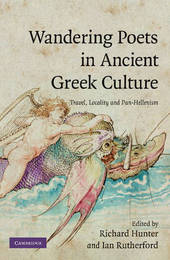
|
Wandering Poets in Ancient Greek Culture: Travel, Locality and Pan-Hellenism
Paperback / softback
Main Details
| Title |
Wandering Poets in Ancient Greek Culture: Travel, Locality and Pan-Hellenism
|
| Authors and Contributors |
Edited by Richard Hunter
|
|
Edited by Ian Rutherford
|
| Physical Properties |
| Format:Paperback / softback | | Pages:328 | | Dimensions(mm): Height 229,Width 152 |
|
| Category/Genre | Literary studies - classical, early and medieval
Literary studies - poetry and poets |
|---|
| ISBN/Barcode |
9781107404052
|
| Classifications | Dewey:881.0109 |
|---|
| Audience | | Professional & Vocational | |
|---|
| Illustrations |
Worked examples or Exercises
|
|
Publishing Details |
| Publisher |
Cambridge University Press
|
| Imprint |
Cambridge University Press
|
| Publication Date |
8 December 2011 |
| Publication Country |
United Kingdom
|
Description
Although recent scholarship has focused on the city-state as the context for the production of Greek poetry, for poets and performers travel was more the norm than the exception. This book traces this central aspect of ancient culture from its roots in the near Eastern societies which preceded the Greeks, through the way in which early semi-mythical figures such as Orpheus were imagined, the poets who travelled to the brilliant courts of archaic tyrants, and on into the fluid mobility of imperial and late antique culture. The emphasis is both on why poets travelled, and on how local communities used the skills of these outsiders for their own purposes. Wandering poets are also set within the wider context of ancient networks of exchange, patronage and affiliation between communities and are seen as one particularly powerful manifestation of a feature of ancient life which is too often overlooked.
ReviewsReview of the hardback: '... this is a wonderful book. It deals with a matter whose importance is still underestimated. The authors of the different papers enter into a dialogue with each other and write in a way that is certain to inspire new research. All in all, this is an amazing collection.' Bryn Mawr Classical Review
|